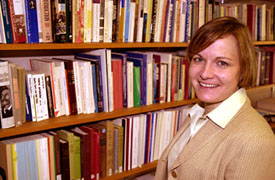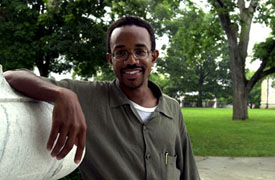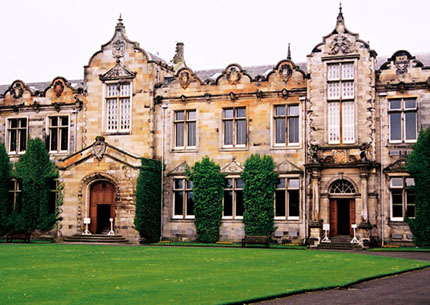TIGER
WOODS has played its links, and Prince William chose
it as his college town. But long before it made headlines for
celebrity sightings, St. Andrews was well-known for its prestigious
University, picturesque setting, and the game of golf.
The
medieval city wraps around the spired buildings of St. Andrews
University’s three oldest colleges–St. Salvator, St.
Leonards, and St. Marys–which date to the mid-fifteenth
and sixteenth centuries. Although modern facilities have been
added, St. Andrews exudes an Old World charm and prestige that
draws students from all over the world.
Fewer
than half the University’s six thousand students are from
Scotland; the majority come from England and abroad. And every
year since 1976, this group has included Emory students through
the Robert T. “Bobby” Jones Jr. scholarship and exchange
program.
Jones,
who attended Emory law school between 1926 and 1927, became
world-renowned when he won golf’s “Grand Slam”
in 1930–the British Open, British Amateur, U.S. Open, and
U.S. Amateur. After his death in 1971, a group of friends and
colleagues honored him with a trust that funds the exchange
program.
St.
Andrews, known as the birthplace of golf and home to the Royal
and Ancient Golf Club which boasts the famous Old Course, seemed
the perfect institution for such a program. The city had long
ago adopted Bobby Jones, granting him the Freedom of the City
and Royal Borough of St. Andrews in 1958 (the first American
to be so honored since Benjamin Franklin in 1759).
So
far, nearly one hundred Emory students selected for their “intellectual
excellence and record of significant leadership” have attended
St. Andrews, and Emory has hosted about the same number of St.
Andrews students.
 “I
was from a small town in Arkansas–Russellville–and
not only was it my first time out of the country, but I was
the first member of my immediate family to travel outside of
the country,” says Polly Price (left), now a professor
of law at Emory, who was selected in 1984 to be a Bobby Jones
Scholar. “One of the first things I remember seeing after
getting off the train was a magnificent cathedral and a castle
nearby. I had never seen anything that historic. And it was
an easy place to make friends–although at first I had a
difficult time understanding what was said to me, and my Southern
dialect was equally difficult for them.”
“I
was from a small town in Arkansas–Russellville–and
not only was it my first time out of the country, but I was
the first member of my immediate family to travel outside of
the country,” says Polly Price (left), now a professor
of law at Emory, who was selected in 1984 to be a Bobby Jones
Scholar. “One of the first things I remember seeing after
getting off the train was a magnificent cathedral and a castle
nearby. I had never seen anything that historic. And it was
an easy place to make friends–although at first I had a
difficult time understanding what was said to me, and my Southern
dialect was equally difficult for them.”
Price
and about a hundred other Bobby Jones Scholars from both sides
of the Atlantic celebrated the twenty-fifth anniversary of the
program with a reunion gala at St. Andrews this summer, envisioned
by Senior Vice President for Institutional Advancement William
H. Fox and organized by Associate Director of Institutional
Advancement Marjorie Nunn and Director of Development for Emory
College Caroline Moise.
“This
was a five-year dream of mine–something I thought would
give new clarity and vision to the program,” Fox said.
“It really was magical.”
Emory
President William M. Chace and his wife, JoAn, were there for
the occasion, as was St. Andrews Principal Brian Lang.
“The
reunion was almost euphoric in its warmth and good vibes,”
said John Ingersoll, senior associate vice president of arts
and sciences development at Emory and secretary of the committee
for the scholarship. “For the first time, I think the Jones
Scholars see themselves not as a specific quartet of one-year
sojourners, but as a two-hundred-member club that is as illustrious
as any.”
The
scholars say they feel a connection not only to each other but
to Jones himself.
“I
grew up in Georgia listening to stories my grandfather [George
F. Nunn ’35C] would tell about Bobby Jones,” says
Christopher Nunn, who spent a year as a Jones Scholar after
graduating from Emory in 1996. “He was such a well-rounded
individual, in athletics, academics, and business. A true gentleman
of yesteryear. There are very few scholarships where people
relate to the namesake, but as I walked through St. Andrews,
I saw it through his eyes.”
After
the reunion, Nunn was inspired to try to form an alumni network
of Jones Scholars. “We’re such a broad group of people
with such diverse interests. One is with the State Department,
one is acting in London’s West End, another is the head
of surgery at Memorial Sloan-Kettering, . . .” says Nunn,
a consultant in Atlanta. “All of our lives, in part, were
shaped by that year at St. Andrews.”
Dan
Colman, a New York actor who is performing in the North Carolina
Shakespeare Festival this summer, was a Jones Scholar in 1997
and started an improv group at St. Andrews–Blind Mirth–that
he was glad to see during the reunion was still up and running
five years later.
“We
performed in pubs, the student center–it was great,”
says Colman. “I studied Shakespeare, experienced single-malt
Scotch, and went to the Highlands. This summer, as I was walking
around through the streets of the town, every spot held a memory.”
A highlight was taking a midnight swim in the frigid waters
of the North Sea–an annual tradition among St. Andrews
students called the “May dip.”
“All
four Jones Scholars from my year were there. We had all lost
contact, so we did a lot of catching up,” Colman says.
“We became a lawyer, a teacher, a writer, and an actor–the
same scholarship, different paths.”
 Kwame
Lawson (left), now a professor at Georgia State University,
spent six years at St. Andrews, staying beyond his one-year
Jones scholarship in 1992 to gain a doctorate in contemporary
Arabic literature.
Kwame
Lawson (left), now a professor at Georgia State University,
spent six years at St. Andrews, staying beyond his one-year
Jones scholarship in 1992 to gain a doctorate in contemporary
Arabic literature.
“St.
Andrews took a very different approach to the teaching of the
language and the literature. It was very old school,” Lawson
says. “There wasn’t as much emphasis on proficiency
in the language; we spent more time discussing the higher elements
of the literature. I originally had not planned on getting into
academia–I was thinking more about foreign service, government-oriented
work. So it definitely changed the trajectory of my life.”
Scholars
from both sides of the ocean frequently used their year abroad
to travel, which is encouraged with a stipend from the Jones
trust.
Amanda
Ridings, a math major at St. Andrews who came to Atlanta in
1981 as a Jones Scholar, vividly remembers driving cross-country
with a friend she met at Emory and being awed by the urban splendor
of San Francisco and the open range of the heartland.
“I
went to forty-two states,” says Ridings, now an independent
management consultant in Scotland who serves as a trustee for
the Bobby Jones program. “We drove across America several
times, living on peanut butter. The weather was amazing–days
and days of blue, cloudless skies. I remember camping in Oklahoma
at dusk, with all these fireflies flitting about. We don’t
have anything vaguely approaching fireflies in Scotland. And
the people we met were very warm and generous.”
Price,
the 1984 scholar, went to law school at Harvard after returning
from St. Andrews.
“My
time there gave me so much confidence. I learned I could travel
to a completely different country and make friends, do well,
and be happy. It inspired a lifelong love of travel,” she
says. “I’ve taught at the law school in Dresden, traveled
to South Africa on a state department trip, visited Central
and South America.”
For
what he inspired in a small-town girl from Arkansas who decided
that she, too, wanted to be a lawyer, Bobby Jones can be quite
proud.–M.J.L.
To
find out more about Bobby Jones, go to
www.bobbyjones.com. If you are a former Jones scholar and
want to find out more about the Jones Scholar alumni network,
contact mnunn@emory.edu.
